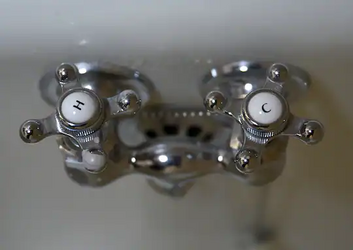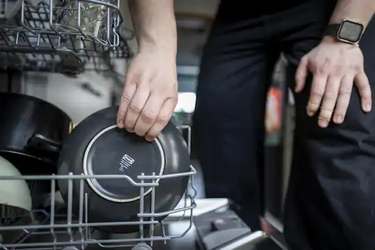By Allyson Chiu
May 12, 2024 at 6:30 a.m. EDT

Dermatologists say that washing up with cooler water may be beneficial to your skin. (Robert Alexander/Getty Images)
You may not be giving a second thought to setting your washing machine on the hot cycle, cranking your showers to a steamy temperature or scrubbing your dirty dishes under a stream of scalding water.
If you did, you’d find that you probably don’t need to use so much hot water — and that you could be saving energy and cutting your utility bills. Water heating is responsible for more than 10 percent of both annual residential energy use and consumer utility costs, the biggest share after air conditioning and heating, according to the Energy Department. An American household uses an average of 64 gallons of hot water a day — close to the amount needed to fill an average bathtub — by doing laundry, showering, washing the dishes and running kitchen and bathroom faucets.
While there are home improvements that can help you cut back on the energy it takes to heat water, including installing a heat pump water heater, one easy solution is to switch to cold water.
Here’s where it makes most sense to dial back the heat.

Doing laundry in cold water saves money and is good for the environment, says Joe Vukovich, a staff attorney at the Natural Resources Defense Council. (Benjamin C Tankersley for The Washington Post)
Washing machines guzzle an average of 25 gallons of hot water per use, according to the Energy Department — the most compared to other common household activities.
“Doing laundry is a big area where using cold water makes a difference,” said Joe Vukovich, a staff attorney at the Natural Resources Defense Council who works on energy efficiency.
Water heating also consumes about 90 percent of the energy it takes to operate a washing machine, according to Energy Star. Changing your washer’s temperature setting from hot to warm can cut energy use in half. Washing with cold water can reduce your energy footprint even more.
By washing four out of five loads of laundry in cold water, you could cut 864 pounds of CO2 emissions in a year, an amount equivalent to planting 0.37 acres of U.S. forest, according to the American Cleaning Institute.
Experts encourage using the cold cycle as much as possible. Hot water settings are only really necessary for sanitizing or if your clothes have grease on them. Modern laundry detergents, even those that aren’t marked for cold-water use, are typically formulated to clean just as well at lower temperatures.
“Using cold water for laundry is a great recommendation for everyone,” Vukovich said. “It’s something you can do with little effort or disruption to your life, it saves you money, and it’s good for the environment.”
A cold shower not only uses less energy than a hot one, but it also saves water because you don’t have run the tap while you wait for it to heat up, said Jennifer Amann, senior fellow in the buildings program at the American Council for an Energy-Efficient Economy, a nonprofit group. You should also rethink washing your hands with hot or warm water for the same reason, she added.
“If you’re wasting cold water to get your hot water, then you’re really wasting both water and the energy resources,” she said. “Those energy resources still come largely from fossil fuels and so they’re adding to emissions in the environment at a time when we really need to be doing everything we can to reduce carbon emissions.”
Washing up with cooler water could also have additional benefits for your skin, according to dermatologists.
For some people, especially those who have drier skin or skin conditions such as eczema, prolonged exposure to hot water can often do more harm than good, these experts say. Instead of taking long hot showers or baths that can dehydrate your skin, dermatologists recommend showers of no more than 10 minutes, using warm or room-temperature water — or even cold water — which is less drying to skin.

A man loads a dishwasher. (Shutterstock)
You don’t need to pre-rinse before loading the dishwasher and experts recommend scraping food remnants off instead. But if you do rinse, make sure to use cold water, Amann said.
“Don’t use hot, that’s just a waste,” she said.
While dishwashers use hot water, energy efficient models need very little, Amann said. Research suggests that even running a half-empty dishwasher can be less resource intensive than washing a few dishes by hand.
“The good news is there are lots of opportunities — just through your own behavior without laying out a lot of money — to reduce your hot water use,” she said.
Source (Archive)
May 12, 2024 at 6:30 a.m. EDT

Dermatologists say that washing up with cooler water may be beneficial to your skin. (Robert Alexander/Getty Images)
You may not be giving a second thought to setting your washing machine on the hot cycle, cranking your showers to a steamy temperature or scrubbing your dirty dishes under a stream of scalding water.
If you did, you’d find that you probably don’t need to use so much hot water — and that you could be saving energy and cutting your utility bills. Water heating is responsible for more than 10 percent of both annual residential energy use and consumer utility costs, the biggest share after air conditioning and heating, according to the Energy Department. An American household uses an average of 64 gallons of hot water a day — close to the amount needed to fill an average bathtub — by doing laundry, showering, washing the dishes and running kitchen and bathroom faucets.
While there are home improvements that can help you cut back on the energy it takes to heat water, including installing a heat pump water heater, one easy solution is to switch to cold water.
Here’s where it makes most sense to dial back the heat.
Laundry

Doing laundry in cold water saves money and is good for the environment, says Joe Vukovich, a staff attorney at the Natural Resources Defense Council. (Benjamin C Tankersley for The Washington Post)
Washing machines guzzle an average of 25 gallons of hot water per use, according to the Energy Department — the most compared to other common household activities.
“Doing laundry is a big area where using cold water makes a difference,” said Joe Vukovich, a staff attorney at the Natural Resources Defense Council who works on energy efficiency.
Water heating also consumes about 90 percent of the energy it takes to operate a washing machine, according to Energy Star. Changing your washer’s temperature setting from hot to warm can cut energy use in half. Washing with cold water can reduce your energy footprint even more.
By washing four out of five loads of laundry in cold water, you could cut 864 pounds of CO2 emissions in a year, an amount equivalent to planting 0.37 acres of U.S. forest, according to the American Cleaning Institute.
Experts encourage using the cold cycle as much as possible. Hot water settings are only really necessary for sanitizing or if your clothes have grease on them. Modern laundry detergents, even those that aren’t marked for cold-water use, are typically formulated to clean just as well at lower temperatures.
“Using cold water for laundry is a great recommendation for everyone,” Vukovich said. “It’s something you can do with little effort or disruption to your life, it saves you money, and it’s good for the environment.”
Bathing
Showering accounts for roughly 17 percent of the water Americans use in their homes, according to the Environmental Protection Agency. Your steamy showers also consume energy: Nearly half of a home’s hot water is used for bathing.A cold shower not only uses less energy than a hot one, but it also saves water because you don’t have run the tap while you wait for it to heat up, said Jennifer Amann, senior fellow in the buildings program at the American Council for an Energy-Efficient Economy, a nonprofit group. You should also rethink washing your hands with hot or warm water for the same reason, she added.
“If you’re wasting cold water to get your hot water, then you’re really wasting both water and the energy resources,” she said. “Those energy resources still come largely from fossil fuels and so they’re adding to emissions in the environment at a time when we really need to be doing everything we can to reduce carbon emissions.”
Washing up with cooler water could also have additional benefits for your skin, according to dermatologists.
For some people, especially those who have drier skin or skin conditions such as eczema, prolonged exposure to hot water can often do more harm than good, these experts say. Instead of taking long hot showers or baths that can dehydrate your skin, dermatologists recommend showers of no more than 10 minutes, using warm or room-temperature water — or even cold water — which is less drying to skin.
Dishes

A man loads a dishwasher. (Shutterstock)
You don’t need to pre-rinse before loading the dishwasher and experts recommend scraping food remnants off instead. But if you do rinse, make sure to use cold water, Amann said.
“Don’t use hot, that’s just a waste,” she said.
While dishwashers use hot water, energy efficient models need very little, Amann said. Research suggests that even running a half-empty dishwasher can be less resource intensive than washing a few dishes by hand.
“The good news is there are lots of opportunities — just through your own behavior without laying out a lot of money — to reduce your hot water use,” she said.
Source (Archive)